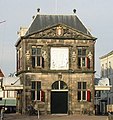Pieter Post


Pieter Jansz Post (1 May 1608 – buried 8 May 1669) was a Dutch Golden Age architect, painter and printmaker.
Biography
Post was baptised in Haarlem, the son of a stained-glass painter and the older brother of painter Frans Post.[1] He is credited with the creation of the Dutch baroque style of architecture, along with his longtime collaborator Jacob van Campen. Together they designed the Mauritshuis in the Hague.[2] According to Houbraken he was a famous architect who introduced his brother Frans to Maurice of Nassau, Prince of Orange, while he was working on plans for the Mauritshuis.[3]
According to the RKD he became a member of the Haarlem Guild of St. Luke in 1623, and became painter and architect for Stadhouder Frederik Hendrik.[4] He was the overseer from 1640 for the new additions to Paleis Noordeinde in The Hague.[4] From 1645 he was the architect for Frederik Hendrik for Huis ten Bosch, where he worked together with Jacob van Campen.[4] He died in The Hague, aged 61. His son Maurits became an architect, and his son Johan Post became a painter,[4] and his daughter married the anatomist and collector Frederik Ruysch. His granddaughter Rachel Ruysch became a famous flower painter.
Architectural work
- 1642 Design Museum Dedel, The Hague
- 1643 Huis Prinsessegracht 4 (the Hague)
- 1645-1650 Huis ten Bosch (the Hague)
- 1645-1648 Gemeenlandshuis Zwanenburg, Halfweg
- 1649-1653 Huis De Onbeschaamde, Dordrecht
- 1652-1657 Gebouw van de Staten van Holland, (the Hague)
- 1655 Johan de Witt Huis, (the Hague)
- 1657-1658 De Waag, Leiden
- 1659-1685 Maastricht City Hall, Maastricht
- 1659-1662 Kruithuis, Delft
- 1660 Hofje van Nieuwkoop (Den Haag),
- 1661-1662 Torendeel van Lambertuskerk in Buren
- 1662-1665 Heeze Castle, Heeze
- 1662-1680 Hervormde Kerk, Bennebroek
- 1663 Kerk van Stompetoren
- 1667 Oostkerk, Middelburg, Middelburg, Zeeland
- 1668- Kaaswaag, Gouda
Gallery
- Huis ten Bosch (the Hague), built 1645-1650
- Mauritshuis (The Hague)
- De Waag Leiden
- Kaaswaag Gouda
- Dedel House (Huis Dedel) at Prinsegracht 15 in The Hague
- Gemeenlandshuis Zwanenburg, former seat of the Hoogheemraadschap van Rijnland waterboard, in Halfweg
- Hofje van Nieuwkoop (Den Haag)
- Dutch Reformed church of Bennebroek, which was finished posthumously in 1680.
- One of the "towers" of the "Kruithuis" in Delft
- Maastricht city hall, considered Post's most accomplished work. After a drawing by Pieter Post
References
- ^ "The Getty: Pieter Post". Archived from the original on December 13, 2006. Retrieved October 24, 2006.
- ^ "Post, Pieter — Encyclopædia Britannica". Retrieved October 24, 2006.
- ^ (in Dutch) Pieter Post Biography in De groote schouburgh der Nederlantsche konstschilders en schilderessen (1718) by Arnold Houbraken, courtesy of the Digital library for Dutch literature
- ^ a b c d Pieter Post in the RKD
External links
 Media related to Pieter Post at Wikimedia Commons
Media related to Pieter Post at Wikimedia Commons- Pieter Post on Artnet










